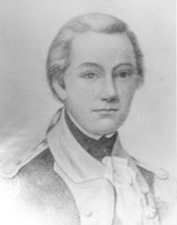William North
| William North | |
|---|---|
 |
|
|
United States Senator from New York |
|
|
In office May 5, 1798 – August 17, 1798 |
|
| Preceded by | John Sloss Hobart |
| Succeeded by | James Watson |
| Personal details | |
| Born | 1755 Pemaquid, Maine |
| Died | January 3, 1836 (aged 80–81) New York City |
| Political party | Federalist |
| Spouse(s) | Mary Duane |
| Relations |
James Duane (father-in-law) Friedrich Wilhelm von Steuben (adopted father) |
| Children | 6 |
| Profession | Soldier, Statesman |
William North (1755 – January 3, 1836) was an American soldier and politician.
He was the son of John North, who commanded Fort Frederick in 1751, and Fort St. George in Thomaston, Maine, in 1758. He moved with his mother, Elizabeth North, to Boston, Massachusetts.
He entered the Continental Army in 1775, and served under Benedict Arnold in the unfortunate expedition to Canada in that year. He was appointed in May 1777 as captain in Henry Jackson's 16th Massachusetts Regiment, with which he participated in the Battle of Monmouth. In 1778 he met Baron Steuben, and the following year was appointed his aide-de-camp, and greatly assisted him introducing his system of discipline in the Continental Army. Later he accompanied Steuben to Virginia, and was present at the surrender of Cornwallis.
North was appointed by Act of Congress a Major in the 2d United States Regiment on October 20, 1786. After the war he settled in Duanesburg, New York, where he married.
He was appointed adjutant general of the United States Army with the rank of brigadier general on July 19, 1798, but was mustered out on June 10, 1800, as tensions with France diminished. In March 1812, he was again appointed adjutant-general of the Army, but declined.
North and a fellow aide-de-camp, Captain Benjamin Walker, were formally adopted by Steuben, and made his heirs. Some historians believe that these 'extraordinary intense emotional relationships' were romantic, and given Steuben's reported earlier behaviour, it has been suggested it would have been out-of-character for him if they were not. However, based on the limited historical record, it is impossible to prove. Following Baron Steuben's death, North divided the property bequeathed to him among his military companions.
...
Wikipedia
